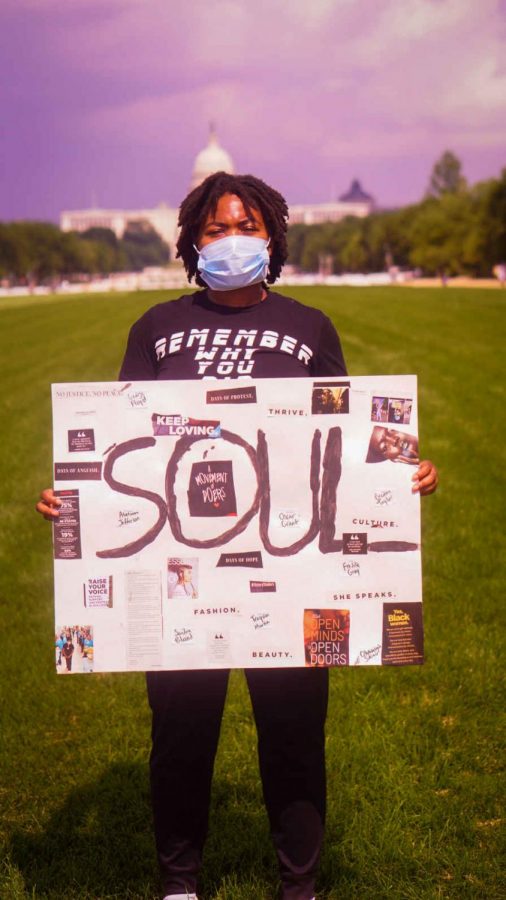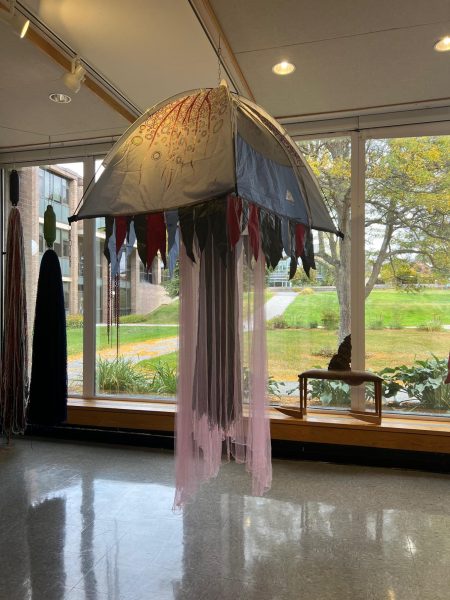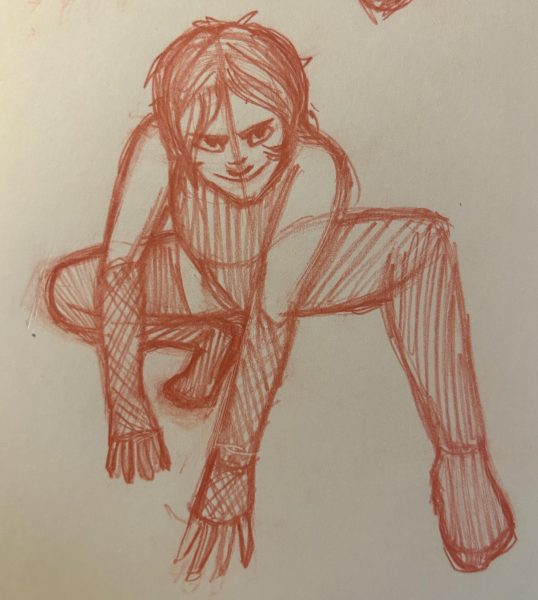Devyn Thompson’s unflinching “Soul”
Devyn Thompson standing with her sign to represent her recently published book of poetry.
Devyn Thompson, a sophomore on the women’s basketball team, published her first poetry book in July. The book is titled Soul and features seven chapters. Thompson has been writing poetry since the sixth grade. She spent most of her time during quarantine writing poetry as a method of meditation and self reflection.
“I titled it Soul because it’s my very essence on paper,” said Thompson. “My triumphs, my mistakes, my fears, my hopes and dreams. It takes years for people to truly open up to others and even still there’s a side of someone others never get to see. Well, this is all of me. No filter.”
Thompson had a push to publish this book this summer. This was because of the events happening in America that she related to as a black woman in this country. This book gave Thompson a new platform to speak on creating change in her life through her own experiences.
“My book is focused around telling the truth, the full uncensored truth,” said Thompson. “Truths that get swept under the rug to be specific. The truth about colonization, protecting African culture in a white environment, the truth about exploring sexuality and questioning double standards, generational trauma, sexism, what it means to be middle/lower class socioeconomically, deforestation, pollution and finally religion.”
Thompson’s voice is present throughout her book. Her stories about liberation and finding her true soul help. At the beginning of each chapter, there are vivid images of Thompson.
These images paint a picture for the reader about how intense or emotional that chapter will be. The most powerful image before her introduction to her book is a black and white image of Thompson looking up while holding her neck up with a red scarf. Her top is also red and if you look closely enough, her teeth are red as well.
The chapters are about different social issues and how these issues attack one’s self-expression. The first chapter, “Survival,” talks about finding liberation. “Desire” is about female sexuality, confidence and sexual liberation. This chapter has a focus on emotion, especially during heartbreak.
The chapter titled “Will” talks about Thompson’s experiences living in a world as a lower-class citizen. “Air” is an emotional chapter that gives a look into experiences when Thompson was faced with a tremendous amount of grief. This chapter also speaks about how she found closure and the pain that it caused her.
The fifth chapter is “Sound,” and is about the silence of victims of traumas. “Light” is about the environmental issues that our world is facing and the call of attention to help save the world. The final chapter is “Thought.” This chapter focuses on she challenges her religion and how Thompson advocates for unity.
“A lot of these concepts we don’t question because it’s taboo,” said Thompson. “I wanted to do what a lot of people are afraid to do, which is question everything.”
Thompson wants her readers to know that her experiences written in her poetry is for the intent for finding related experiences. The issues that she brings awareness to throughout the book are meant to be challenged.
This book only contained a small number of stories Thompson has shared through her poetry. When asked if she were to add more chapters to this book, Thompson was quick to share her ideas.
“If I were to add anything to this book,” Thompson said, “it would be two things. A chapter specifically dedicated to the younger generations of children because I want to be a bigger representation for children who feel they can’t express themselves or feel out of place.”
The second new chapter Thompson would add is an emotional portrayal of Mamadou N’Diaye, her best friend and student who passed away this summer. She would have dedicated this book to Mamadou.
“The book came out a week or two before his death,” Thompson said. She pointed out the specific lines in her book that speak about her anger about the aftermath of N’Diaye’s death. Thompson quoted her book: “a mother should never have to bury their child.”
When speaking on the subject of death, Thompson expressed her emotions that are still haunting her. “I’m not happy I got it right,” she said. “I’m angry that I knew how the whole thing could play out and I didn’t say anything.” She is speaking about how the investigation of Mamadou’s death. The day of his death, Mamadou drowned because he did not know how to swim while spending time with his girlfriend’s family. He was encouraged to jump off the boat without life vest, which he did not want to wear on the boat. Thompson knew that he should not have gone on that boat without an adult telling him to wear a life vest for safety.
After the release of the book in July, she has received five-star reviews for Soul. Since returning to campus this fall, she has been praised by her teachers, classmates, fellow teammates and friends. Her book was featured in the “Student-Athlete Spotlight” on the NVU Badgers website as part of a series on student-athletes’ work and experiences off the court.
“The general response so far has been extremely supportive which I’m very happy about,” said Thomson. “Family and friends are in love and in shock with the book which is exactly what I wanted. I want people to be able to relate to it which they have, I want people to learn from it which they have, and most of all I want to see change because of the book.”
Thompson was surprised by the support and praise she received from her family. “My family consists of old fashioned, Baptist Christians,” she said. “They all know I’m agnostic. They all see me in a different light now, and still were fine with it and embraced it. The most surprising thing was being able to be completely vulnerable with no repercussions.”
Devyn Thompson’s book is sold on Amazon in paperback or Kindle reader editions. She self-published through Lulu Publishing. It can be found on Amazon by searching “Soul Devyn Thompson.”
Thompson’s final message is powerful. “If you’re a black man reading this: your height, black facial features, skin complexion and sexual appeal are NOT personality traits,” she said. “That’s not a good enough reason anymore for girls of any color especially non-women of color to desire you. Black people have been fetishized since the beginning of colonization. Black men are not your exotic pets. It’s disgusting seeing black people on campus being the center of white fascination.”

Senior, Pre-Law & Journalism
Grew up in Middle Town, NY
Fall 2019 - Present
My spirit animal is a Narwhal because they are the aquatic unicorns!








